Illinois Baptist





 BY THE NUMBERS
BY THE NUMBERS

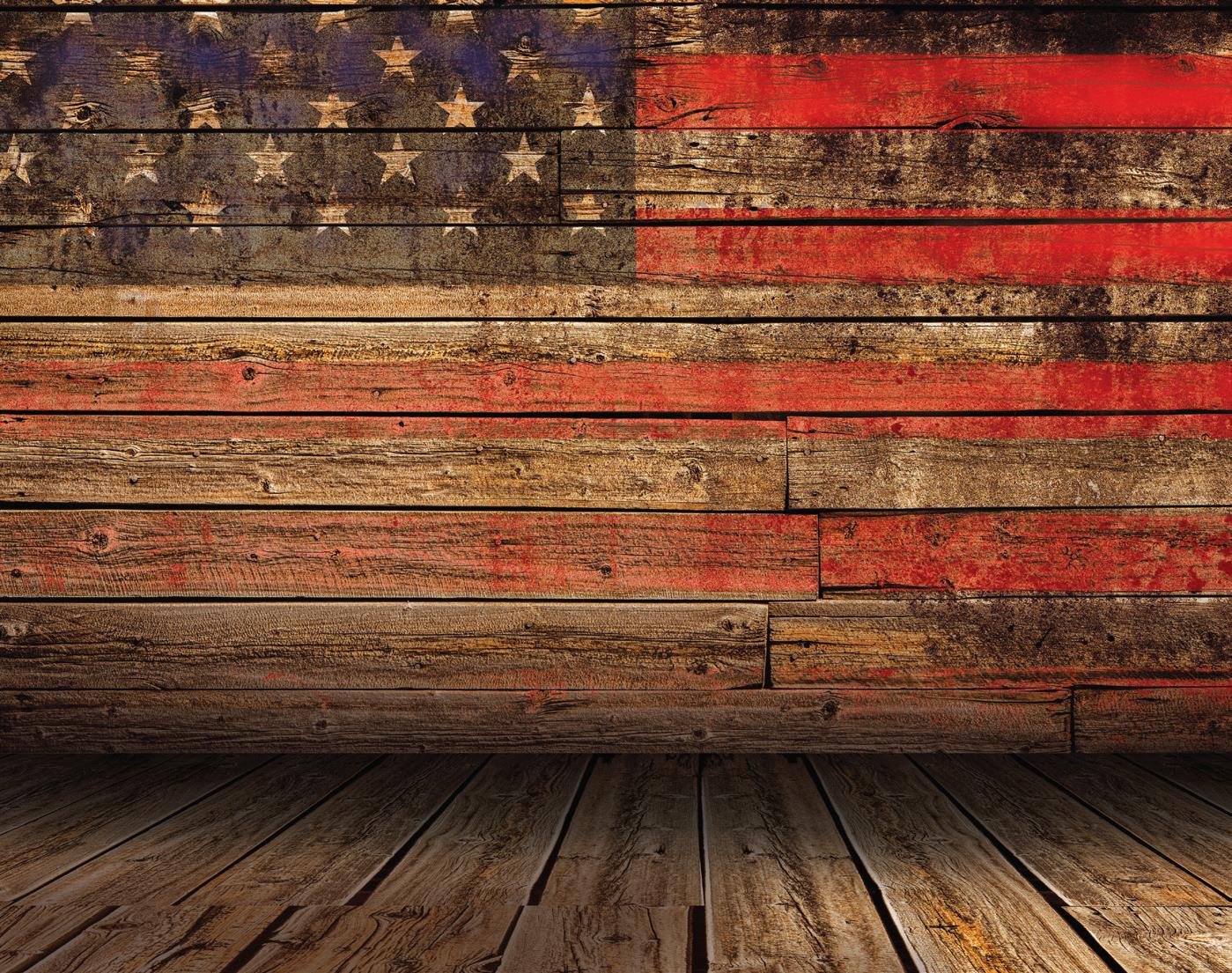
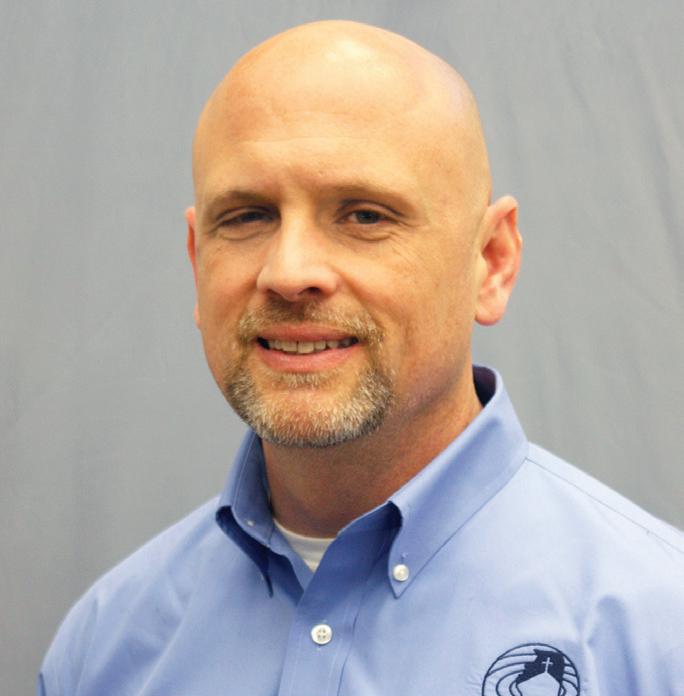



Nashville, Tenn. | The Southern Baptist Convention has reported its largest decrease in membership in more than a century, and its lowest baptism total since World War 2. The declines, reported in the 2019 Annual Church Profile (ACP) released in June, follow downward trends over the last several years, but, in terms of membership, represent a historically steep drop.
Total membership in the SBC fell almost 2% from 2018 to 2019. The decline of 287,655 members is the largest single-year drop in more than 100 years. Baptisms fell by more than 4%. In 2019, there was one baptism for every 62 Southern Baptists.
Snapshots from the world of Illinois Baptists
VIEWING HABITS
Barna asked practicing Christians how they worship while streaming a church service online.
I pray along with prayers
My household watches together at the same time
I sing along with worship
I usually multi-task while the service is streaming I take notes
I enjoy commenting and interacting with other people who are watching the service
– Barna, June 2020
Location: Hyde Park
Focus: Millennials and Gen Z
Characteristics: Religiously diverse Hyde Park is home to the University of Chicago and many new businesses started by recent graduates.
Prayer needs: Hyde Park needs a church willing to think creatively and to share the gospel in a rapidly shifting culture.
– IBSA Church Planting Team
the cooperative program
Giving by IBSA churches as of 06/19/20 $2,521,868
Budget Goal: $2,907,692
Received to date in 2019: $2,736,937
2020 Goal: $6.3 Million
Editor - Eric Reed
Managing Editor - Meredith Flynn
Graphic Designer - Kris Kell
Contributing Editor - Lisa Misner
Administrative Assistant - Leah Honnen
The general telephone number for IBSA is (217) 786-2600. For questions about subscriptions, articles, or upcoming events, contact the Illinois Baptist at (217) 391-3119 or IllinoisBaptist@IBSA.org


The Illinois Baptist is seeking news from IBSA churches. E-mail us at IllinoisBaptist@IBSA.org to tell us about special events and new ministry staff.

POSTMASTER: The Illinois Baptist is owned and published every month by the Illinois Baptist State Association, 3085 Stevenson Drive, Springfield, Illinois 627034440. Subscriptions are free to Illinois Baptists. Subscribe online at IBSA.org.
 NATE ADAMS
NATE ADAMS
The wisdom of Ecclesiastes 3:7 reminds us that there is a time to be silent and a time to speak. Of course the tough application of that wisdom comes when circumstances force us to choose one or the other.
From time to time, and more often in recent days, I have needed to decide whether IBSA’s Executive Director, and not just Nate Adams personally, should write a letter to the governor or legislature, or join others in a public statement, or even pursue litigation.
Here are four questions I have found especially useful in discerning whether to publicly speak, or formally act, on IBSA’s behalf.
1. Has the association of churches as a whole stated a position on the matter?
When I have discussed this issue with the IBSA Board, they have agreed that it is wisest for me to speak on behalf of our diverse IBSA churches when IBSA messengers have passed a resolution on an issue in an annual meeting, or when The Baptist Faith and Message statement speaks clearly and specifically to an issue. This helps limit my voice to IBSA churches’ convictions, and not just my own opinions or the most recent or pressing voices I am hearing.
So for example, while churches in some parts of the state felt legitimately oppressed by the recent COVID-19 based restrictions on public gatherings, churches in other parts of the state considered it dangerous to lift those restrictions. That was not a time for IBSA to speak, but for individual, autonomous churches to speak from the uniqueness of their situations. But when the legislature was voting on same-sex marriage a few years ago, I felt empowered to write every Illinois legislator, enclosing a copy of Illinois Baptists’ resolution opposing that law.
2. Is it a matter of either biblical and Baptist conviction, or constitutionally protected religious freedom?
There are many lesser things that could continually distract us from our primary mission of assisting churches in advancing the gospel. We should reserve the time and attention required for public policy engagement for those matters which are an affront to our most deeply held beliefs, or that threaten our fundamental freedoms.
3. Is the matter of politics, or of legislation?
On the rare occasions I have found it necessary to write government officials or to facilitate IBSA’s participation in litigation, such as when samesex marriage was being considered or when mandatory abortion coverage in health insurance was being mandated, I have sometimes heard the caution that IBSA should not be involved with politics. I very much agree. Politics can be divisive in and among our churches.
But by contrast, legislation can sometimes be about laws that give permission to sin and immorality, or that restrict churches’ religious freedom. I believe IBSA should stay clear of politics, but we must seek to represent and defend churches against unrighteous legislation.
4. Are there other, perhaps more effective ways of pursuing the desired outcome?
Frankly, the few letters I have written to state government have had little effect on outcomes thus far, and in some cases did not even receive a response. IBSA President Sammy Simmons had a similar experience recently when he appealed to the governor, even though it was through his state representative.
That doesn’t mean we shouldn’t write letters. But increasingly, it underscores the value of Christian legal advocates, such as Alliance Defending Freedom, the Thomas More Society, or the Mauck & Baker law firm in Chicago. IBSA is working with all these partners, sometimes behind the scenes in what may seem like silence, to choose the right times and opportunities to use litigation to challenge unfair or unrighteous legislation, and to equip and empower IBSA churches to do so.
Nate Adams is executive director of the Illinois Baptist State Association. Respond at IllinoisBaptist@IBSA.org.

Why IBSA steers clear of politics, but often addresses religious freedom.
Across Illinois | As the state gradually reopens amid looser COVID-19 restrictions, Southern Baptist churches are relaunching in-person gatherings too, and pacing reopening to meet unique needs in their congregations and communities.

All four regions of the state entered phase four of the “Restore Illinois” plan on June 26, meaning gatherings can expand to 50 people. Museums, zoos, and movie theaters can open at limited capacity, as can indoor restaurant dining, but no new guidelines have yet been released for churches.
In late May, as the state prepared to enter phase 3, Gov. J.B. Pritzker released new guidelines for churches that loosened restrictions while still encouraging cautionary measures. The guidance came as two non-SBC churches in Chicago challenged Pritzker’s executive order limiting gatherings to 10 people or fewer, appealing to the U.S. Supreme Court.
After the restrictions were loosened, Elim Romanian Pentecostal Church and Logos Baptist Ministries continued their legal challenge, arguing Pritzker could reinstate his order at some point. The Seventh Circuit Appellate Court ruled June 16 the governor’s order capping the attendance number at 10 or less was constitutional.
In oral arguments, The Center Square reported, judges asked Illinois Assistant Attorney General Priyanka Gupta if she could guarantee Pritzker would confer with the court before reinstating the 10-per-
son limit on religious gatherings. Gupta said the administration would not commit to doing that.
In a survey of IBSA churches in mid-May, 10% reported resuming worship service already, 39% planned to resume worship in June, and 16% in July. Of those surveyed, 8% said it might be fall or next year before they resume in-person services, and another 27% had not decided.
When and how a church reopens depends largely on geography. Congregations in downstate Illinois, where COVID-19 cases are relatively few, have been quicker to relaunch in-person gatherings. In Chicagoland, leaders are moving with caution as the city and suburbs continue to report hundreds of new cases every day. But the number of new cases is decreasing across the state, as are deaths from Coronavirus.
In eastern Illinois, Marshall Baptist Church relaunched in-person services on Father’s Day. Following the Illinois Department of Public Health guidelines encouraging 25% capacity inside worship auditoriums, leaders at the Marshall church opted to hold two services and set aside an overflow room. Members were asked to arrive no more than 10 minutes ahead of the service. Inside the church, only the main foyer, worship center, and bathrooms were open. For those who did attend, Pastor Paul Cooper said hand sanitizer and masks were provided. Every other row of seating was blocked off, plus volunteers and staff wore masks.
Cooper said while attendance was lower that it had been before the pandemic, “it did my heart good that people were still coming.”
Reopening may move at a more deliberate pace for older congregations or church members with preexisting health conditions. Eastview Baptist Church in Springfield reopened with a drive-in service June 14 and plans to continue through July in the same fashion. Pastor Bennie Fisher said the church has been livestreaming its services since March 2 and will continue to do so even as in-person gatherings resume.
“We’ve almost come to the conclusion we’re going to livestream until Jesus comes back,” Fisher said. “It’s so exciting. We’ve heard from people we’re reaching in Florida and Oklahoma. We’re excited.”
As the COVID-19 global pandemic continues to impact churches financially, gifts to the Southern Baptist Cooperative Pro gram for May 2020 were below budget by more than $1.5 million.




The $14,802,344.02 given through the Cooperative Program was 16% less than the same month last year. In Illinois, churches gave $2,521,868 through the Cooperative Program as of June 19, down from $2,736,937 to date in 2019.

“We are not surprised to see the reverberations of the COVID-19 global pandemic on

Cooperative Program receipts,” said SBC Executive Committee President Ronnie Floyd He pointed to many churches across the country beginning to reopen as a hopeful sign for future giving, and thanked churches for providing “financial fuel” for missions causes.
“Your faithfulness in giving through the Cooperative Program is what will keep our missionaries on the mission fields here in America and across the world,” Floyd said. “What each local church determines to give through the Cooperative Program every month makes this possible.”
Continued from page 1
The Supreme Court ruled June 18 that the Trump administration improperly handled its effort to end a federal program for certain undocumented immigrants brought to the U.S. as children. Still, the Court said, all parties agree the administration may indeed rescind Deferred Action for Childhood Arrivals (DACA).

That’s why Southern Baptist ethicist Russell Moore and other leaders are calling Congress to protect Dreamers. “Those who have lived as good neighbors, contributed so greatly to our country, should be protected from the constant threat of having their lives upended,” said Moore, president of the Ethics and Religious Liberty Commission. “Congress should move immediately to protect our Dreamer neighbors.”
The Conservative Baptist Network has announced its 48-member steering council, including several leaders with ties to the Midwest. The network formed earlier this year to address concerns about the direction of the SBC in relationship to social justice, gender roles, and other issues. Two former presidents of Midwestern Seminary, Mark Coppenger and Phil Roberts, were named to the steering committee, along with Anthony Allen, president of Hannibal-LaGrange University in Hannibal, Mo. The group also includes Atlanta pastor Charles Stanley and former Arkansas governor Mike Huckabee.
Southern Baptist leaders talked politics, racism, and a host of other issues during two panel discussions hosted June 9 by the Baptist 21 network. In a discussion about the 2020 election, Southern Seminary President Albert Mohler said there must be room for civil disagreement among Christians who differ in voting choices. Mohler recently made public his intention to vote for President Donald Trump in November.
Kevin Smith, executive director of the Baptist Convention of Maryland/Delaware, said we must recognize that politics is a secondary issue. “It is fine to say the most important [political issue] for me is the life of an unborn baby, but it’s also biblically fine for me to say the most important for me is politicians who don’t call me the n-word, and don’t think I’m the n-word,” said Smith, who is African American. He urged “a little bit of liberty” in political discussions “because they don’t have exegetical definites.”
– Baptist Press
Get breaking news in The Briefing online, posted every Tuesday at www.ib2news.org.
“I grieve at the news that our reported baptism numbers fell again this year, continuing our 50-year decline,” SBC President J.D. Greear wrote in a column for Baptist Press. Greear commended Southern Baptists who serve in “unseen” places doing work not reflected in the reported numbers. “But many of us are disturbed at our increasing spiritual infertility in the midst of communities wandering further and further away from the gospel.”
Scott McConnell, executive director of LifeWay Research said the significant drop in membership is due in large part to the decrease in churchtype missions and congregations continuing to update their membership. He also noted that one state convention did not collect total membership numbers. An estimate for Oklahoma congregations is included in the data based on previous reporting from current congregations.
plete statistical picture of the denomination.
LifeWay Christian Resources compiles the Annual Church Profile in partnership with Baptist state conventions, which set their own procedures and timelines that can range from several months to a year.

“In our high-tech world, our processes cannot have this much lag time,” Floyd said. “It simply cannot take this long and be this complicated. It is past time for us to rethink and re-innovate the SBC [ACP] process.”
“These numbers are not able to tell the story of all the evangelistic efforts that many individuals and churches have put in this past year,” McConnell said. “They do indicate, however, that the efforts of the same number of people in a congregation on average are seeing fewer people come to Christ and being baptized.
“The Southern Baptist Convention is not immune to the increasing secularization among Americans that is seen in more of our children and our neighbors not having interest in coming to Jesus.”
While the statistical decline is concerning for the largest Protestant denomination in America, Ronnie Floyd, the SBC Executive Committee’s president and CEO, also expressed concern with the length of time and effort needed to collect information from cooperating churches, as well as the lack of uniformity, which combine to prevent a com-
In Illinois, 96% of IBSA churches submitted an ACP in 2019, but the percentage is lower across the SBC. According to LifeWay Research, only 75% of Southern Baptist congregations participated by reporting at least one item on the profile—which means approximately 12,000 churches did not report any items. The reporting rate is similar to previous years, but has steadily declined over the past two decades even as reporting technology has increased.
“We cannot possibly know how best to meet the needs of our 47,500 churches when we only receive needed data from just 75% of them,” Floyd said. “Uniformity in our data collection timing, uniformity of the questions asked of our churches, accelerating the response time, and increasing the response rate are vitally important for us so that we will have accurate and current data regarding cooperating churches in the SBC.”
– Baptist Press, Facts & Trends
Richmond, Va. | The International Mission Board had planned to commission 61 missionaries at a Sending Celebration during the Southern Baptist Convention in Orlando. Instead, the missions agency virtually commissioned the missionaries.
The June 9 service, still available for viewing online, featured testimonies from each of the commissioned missionaries. Some spoke directly to the camera, but many testimonies were simply heard over images of the mission field the missionaries will serve.

The Sending Celebration was the first since November 2018 to feature missionaries who will serve in all nine IMB affinities: American, Central Asian, Deaf, East Asian, European, Northern Africa/Middle Eastern, South Asian, Southeast Asian, and Sub-Saharan African.
“Throughout our 175-year history, Southern Baptists have maintained an uninterrupted witness among the nations, in spite of famines, wars, civil unrest and even—as we are expe
riencing right now—a pandemic,” said IMB President Paul Chitwood. “We’re grateful God has continued to expand his kingdom and allowed us to join him in his work. And there is still work to do. That is why IMB is still sending Southern Baptist missionaries.”
outhern Baptists, I think it is time to retire the Broadus gavel,” SBC President J.D. Greear wrote in June for Baptist Press. The gavel, often used at the SBC annual meeting, is named for John A. Broadus, a founding faculty member of Southern Seminary who supported the Confederacy and owned slaves.
The gavel, made of wood from the Holy Land, has been used at SBC annual meet-

ings almost continuously since 1872, when Broadus from South Carolina was elected Convention president.
“This moment in our country requires us to proclaim with absolute clarity that truth we all grew up singing in Sunday School: all races are ‘precious in his sight,’” Greear said. He will consider gavels named for missionaries Adoniram Judson and Annie Armstrong for use in Nashville next year.
Nashville, Tenn. | The Southern Baptist Convention Executive Committee (EC) elected its first African American chair in a special called meeting June 16.
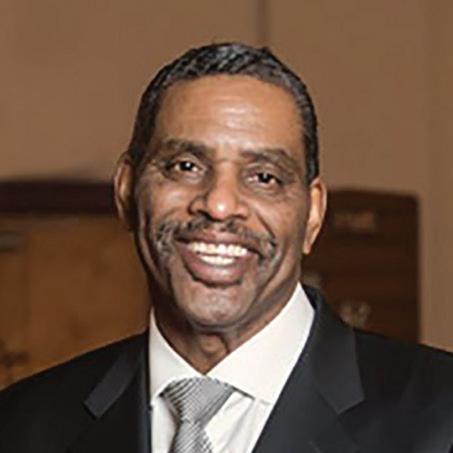
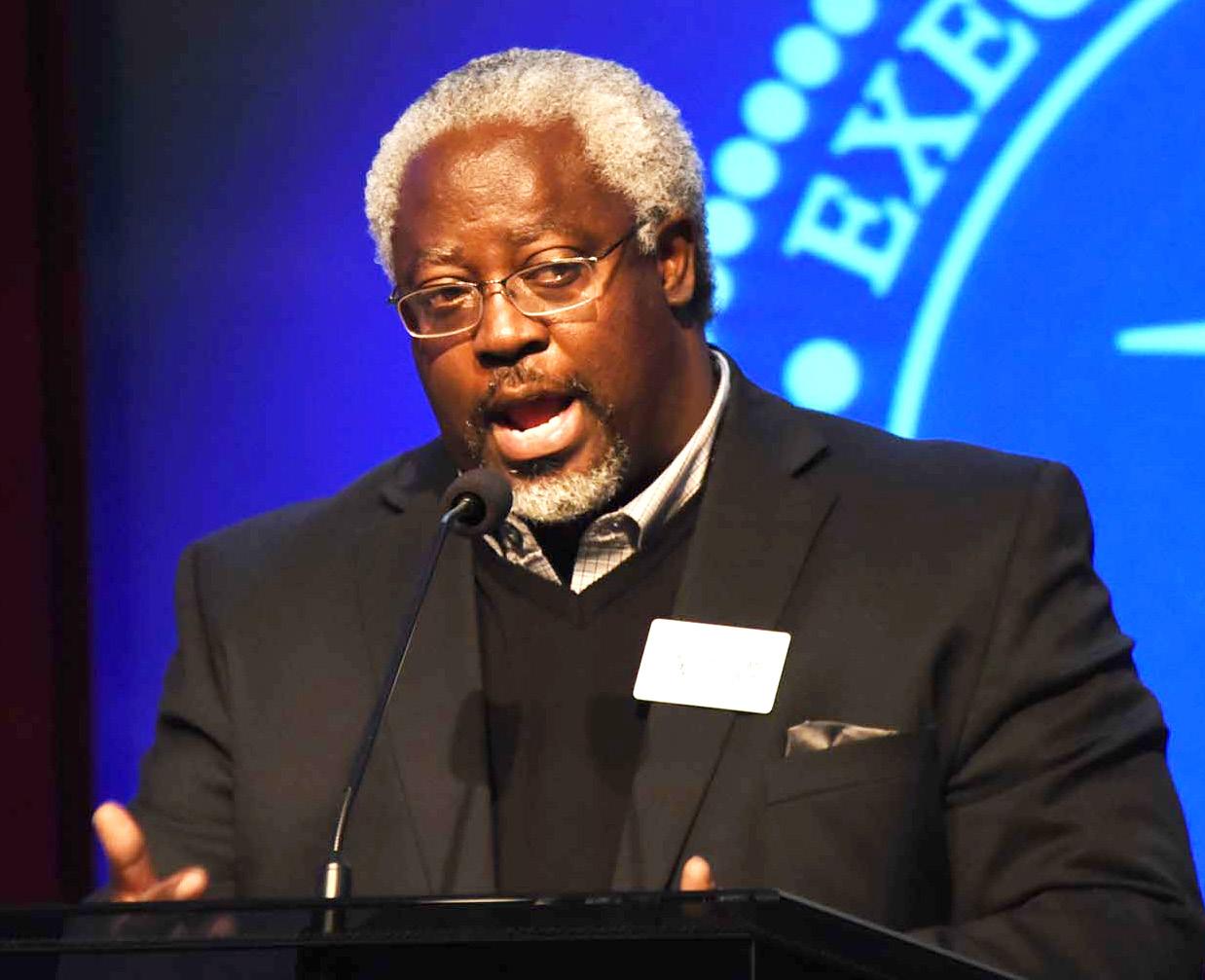
Raleigh-Durham | “We don’t want to make it hard for unbelievers to find their way to God. We want to remove all distractions, all obstacles,” said Southern Baptist Convention President J.D. Greear in an online address June 9.
Putting the gospel above all, Greear said, means the SBC must continue to promote diversity, unity, missions, and prevention of sexual abuse. And remove all obstacles to the gospel. The pastor of The Summit Church in Raleigh-Durham addressed Baptists virtually, in lieu of the president’s message he would have delivered at the SBC’s annual meeting in Orlando.
A week before, Baptist leaders hosted SBC Advance, an online gathering designed to deliver reports similar to what SBC entities would have presented in Orlando. SBC Advance is available for viewing at sbc.net/ advance. Greear’s address is available on his Facebook page. In the virtual message, he focused on Baptist response to key issues, including the sexual abuse crisis. Last year, a newspaper report detailed hundreds of instances of sexual abuse in Southern Baptist churches.
Greear pledged to continue working to make churches safe, and to work alongside LifeWay Christian Resources to add questions to the Annual Church Profile reporting system about each church’s sexual abuse prevention policy. Greear said he will work with the SBC Executive Committee to help make sure that every trustee has a comprehensive background check and will challenge churches to make training in sex abuse prevention part of the ordination process.
The address drew the most attention for its discussion of Black Lives Matter. Greear didn’t promote the Black Lives Matter movement, which he said has been “hijacked by some political operatives whose worldview and policy prescriptions would be deeply at odds with my own,” but he embraced and promoted the sentiment behind the movement.
‘EASY’ LISTENING – SBC President J.D. Greear gave his president’s message June 9 on Facebook, urging Baptists to remove distractions between the gospel and people who need to hear it. “We don’t want to make it hard for unbelievers to find their way to God,” he said.
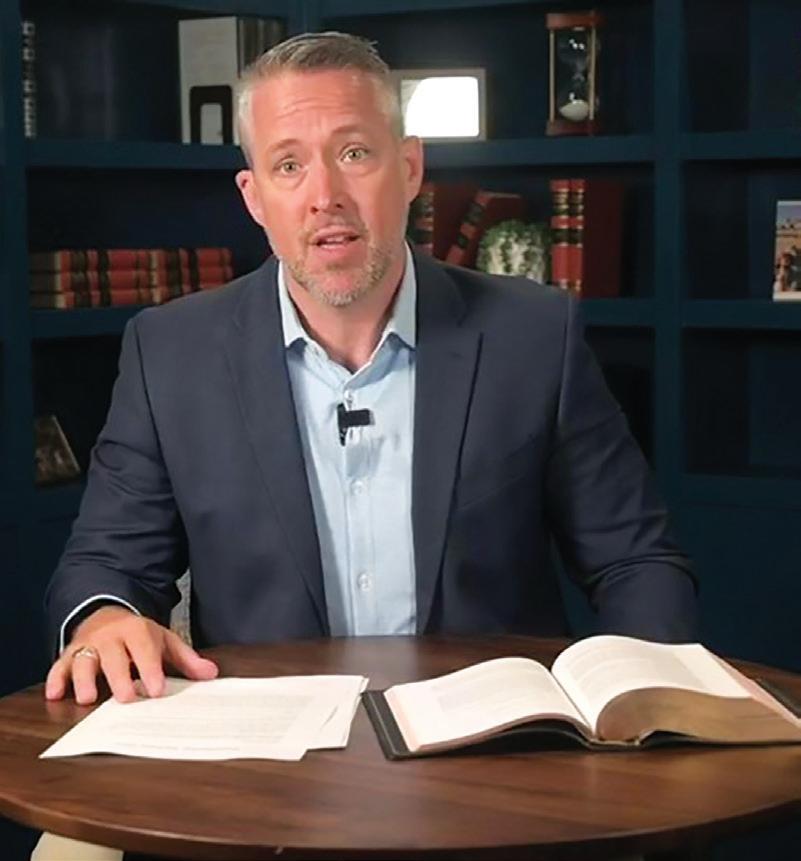
“We know that honoring Christ in this moment, that means listening to those who hurt, it means lamenting with them, and bearing their burdens. Pursuing justice means laboring for the protection of others as fiercely as we would our own children.”
– From Baptist Press reports
Rolland Slade, pastor of Meridian Baptist Church in El Cajon, Calif., was unopposed as EC chair and was unanimously elected by ballot vote. Outgoing chair Mike Stone called for a ballot vote, he said, to mark the historic moment.
Slade served the last two years as EC vice chair. As EC chair, Slade leads the SBC’s fiduciary, fiscal, and executive arm.
Fred Luter, the only African American ever elected as SBC president, praised God for Slade’s election, especially in the midst of nationwide racial tension.
“Rolland is certainly deserving of this historical honor not just because of the color of his skin but because of his knowledge, skills, and leadership as a member of the Executive Committee through the years,” Luter said. “I am proud of Rolland and proud of the men and women of this committee for making this such a historic moment in the Southern Baptist Convention. To God be the glory for the things he has done!”
– Baptist Press
Nashville, Tenn. | Five African American Southern Baptist pastors and leaders joined Executive Committee President Ronnie Floyd for an hour-long virtual conversation on race in America. During the discussion, which included Chicago pastor Charlie Dates of Progressive Baptist Church, leaders called for passion and action around the issue of racial injustice.
“I don’t think we need to write any more resolutions,” said K. Marshall Williams, pastor of Nazarene Baptist Church in Philadelphia. “We need to put some shoe leather in it and effect some change….Our younger generation wants to see practical application of the biblical principle.”
The panelists urged Baptists to view racism and injustice through a biblical lens, and discussed how the SBC can raise up diverse leaders in local churches and the denomination. The conversation was “a launching pad,” said newly elected Executive Committee Chairman Rolland Slade. “We’re going on from here.”
“A 60-Minute Conversation on Race in America” is online at the SBC Executive Committee’s Facebook page.
Now, more than ever. That’s the message of the Cooperative Program resources you’ve seen in this space in the Illinois Baptist, and in current CP promotions online at IBSA.org/cp. Now, more than ever, our cooperative giving is crucial to keeping missionaries on the field, sharing Christ with people around the world.
The COVID-19 pandemic has forced churches into new circumstances they wouldn’t have chosen—circumstances that have served to keep most churches apart. But still, Baptists have stayed committed to the belief that we’re better together.
Over the past few months, you’ve read stories in these pages about some of the work fueled by Baptists’ cooperative spirit, and cooperative giving:
In Chicago, church planters like Jonathan de la O are sharing Jesus in communities hard-hit by Coronavirus.
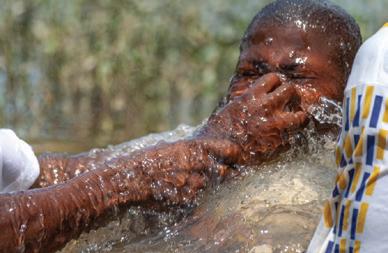
In rural southeastern Illinois, Pastor Rob Windes is leading Freedom Baptist Church in Noble to maintain their Cooperative Program commitment, despite the economic impact of the pandemic.
Across the state, Disaster Relief leaders have partnered with local associations to distribute bleach solution for churches to use as they prepare to reopen.
Across the globe, some missionaries have embraced new assignments and mission fields, while others are finding new ways to meet their neighbors’ urgent needs.
“The Cooperative Program is the fuel which funds our work regionally, statewide, nationally, and globally,” said Ronnie Floyd, CEO of the Southern Baptist Convention Executive Committee. In a recent virtual report to Baptists, Floyd issued a challenge to stay committed to the cooperative spirit inherent in the Cooperative Program, despite numerous challenges churches are facing right now.
“Even in the midst of these challenges, I appeal to you today, keep our missionaries on the mission fields across the entire globe,” Floyd said. “People need Jesus, and people need Jesus now. We cannot and will not retreat in this hour of uncertainty.”
A new video out now is focused on how we can do more together, toward the fulfillment of the Great Commission. Baptists’ legacy of cooperative missions is still needed today—now, more than ever.
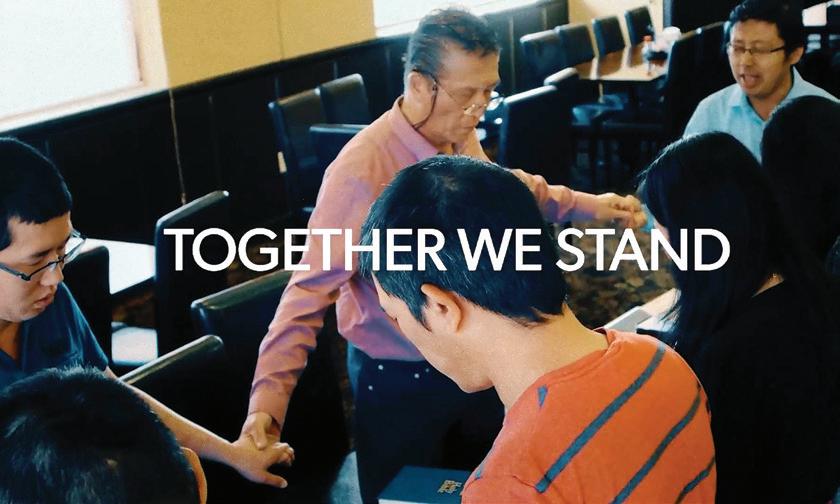

IBSA churches can sign up to receive free quarterly bulletin inserts about the Cooperative Program and its impact in Illinois, and around the world. Use the inserts and video resources to keep your church up-to-date on how CP is helping advance the gospel.




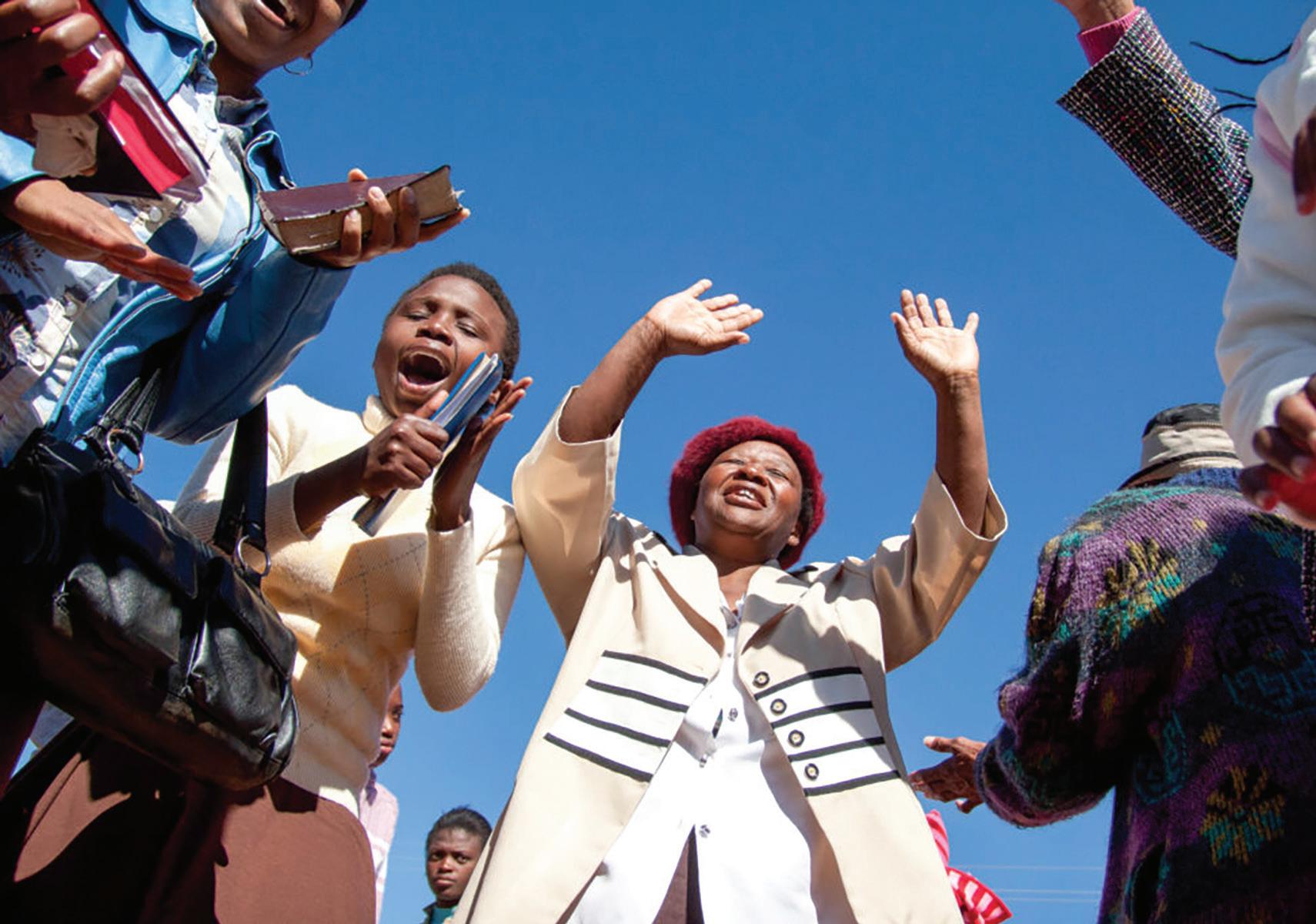
Cooperative Program support is more important than ever.
As our churches seek to recover from the current crisis, please remember those who share the gospel worldwide on behalf of Southern Baptists.
When for a couple of minutes at the Coachella music festival in 2018
Beyoncé sang a few lines from an old hymn, she captivated the audience. Some understood the deep meaning of her offering, so unusual for a pop concert; others didn’t know what it was about, but they recognized the emotion, especially for the few African Americans present.
The song was “Lift Every Voice and Sing,” a hymn written in 1899 to celebrate Abraham Lincoln’s birthday. Twenty years later, it was adopted by the National Association for the Advancement of Colored People, and today is known as the black national anthem. It is included in the 2006 edition of The Baptist Hymnal.
If you knew to listen for it, you could hear in broadcasts of marches and rallies of June 2020 the strains of the anthem “Lift Every Voice.”
Protesters worldwide took to the streets chanting “black lives matter” and “I can’t breathe.” The crowds called for reforms in law enforcement after a white Minneapolis police officer knelt on the neck of a black man, George Floyd, for 8 minutes and 46 seconds, cutting off his air supply and killing him. Within days the names of other people killed in similar actions, both by police and private citizens, were added to the protests and the public discussions: Breonna Taylor and Ahmaud Arbery among them.
And for a few scary days in some cities, marchers were met by looters that devastated mostly black communities and black-owned businesses.
Being careful not to push the Coachella metaphor too far, some got it innately; some didn’t. Some understood the anger and frustration that fueled protests from their personal
Chicago pastor Ron Gray stands with pastors and leaders on the city’s southeast side, as they urge peace in their community at the site of a looted grocery store.
On the front: Protesters march through downtown Chicago at a rally in response to the death of George Floyd in Minneapolis. WMAQ screen capture, published by Baptist Press

experience as generations of racism goes unaddressed. Others could see this historic tipping point from a different perspective, as the need to join in support of siblings suffering in the human experience—to lift every voice.
For the church, the question is “Will we?” Will we all lift our voices, demanding change in our culture, communities, and government, that truly ends racism in all its forms in America?
Lift every voice and sing Till earth and Heaven ring, Ring with the harmonies of liberty.
For everyone.
Marches and aftermath
When video of George Floyd’s death was broadcast nationally to the horror of millions, 12 SBC officers and entity heads and executive directors of 42 state conventions signed a new statement on racism, specifically calling for the end of “racial inequity in the distribution of justice in our country.”
cause is “an amazing gospel opportunity to stand for what you once stood against because you’ve been changed by the power of the gospel,” Stetzer said. “I think the Lord would be honored if Southern Baptists saw their unique responsibility to keep working for justice and race relations.”
And he encouraged study. “I’d encourage all pastors to educate themselves more about the inequalities experienced in communities of color, to know the history and the current challenges that still remain,” Stetzer said. “When you do, you will understand more why people protest.”
Many Illinois marches and protests were peaceful, like a “solidarity procession” that drew 3,000 cars in Springfield. But the arson and violence that hit Minneapolis spread to major cities over several nights, including Chicago.
The road to recovery will be a long one, said Another Chance Church Pastor Kenyatta Smith. He summed up the damage in the Auburn Gresham neighborhood in one word: bad. “It set our community back, it set our economic development back, it set our ministry back. It has set our community totally back.”
Smith encouraged earnest listening among brothers and sisters in Christ, as communities struggle to move forward. And it’s not going to be through the efforts of one race or one community, he added.
“I think this is a scenario where God is opening the eyes of the churches. And this is meant for our good, that we’re able to come out of four walls and deal with what’s in front of us, and that’s each other.”
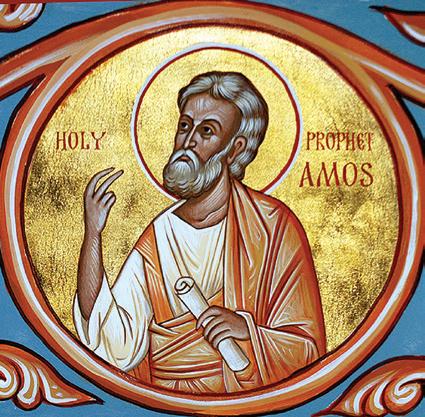
Members and leaders from Crossroads Community Church marched in Glen Ellyn, an affluent suburb of Chicago. “As a church we want to advocate for those in society that are mistreated because of the color of their skin,” said Austin Adams, associate pastor at Crossroads. “We hope these protests would bring about change in our nation and communities.”
The church also joined clean-up efforts in Cicero and facilitated 24 hours of prayer and fasting, ending the time by joining a community walk for racial justice.
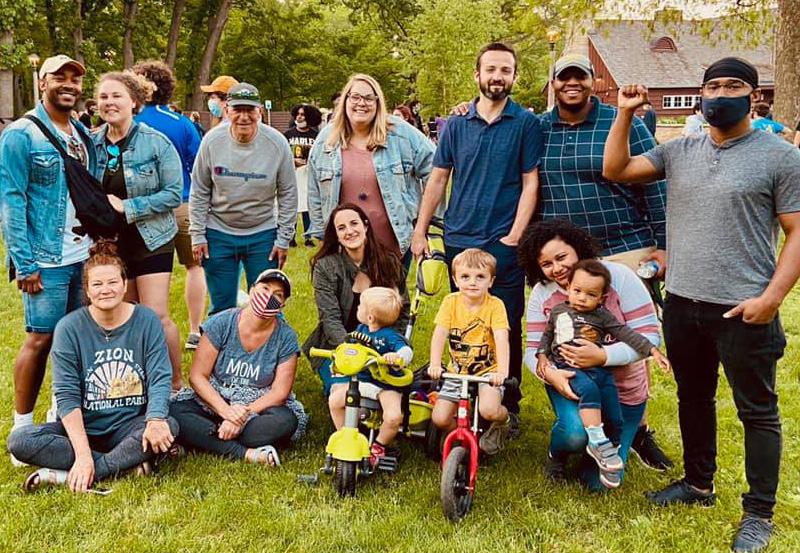
Southern Baptists have made statements seeking racial reconciliation before. The most notable was in 1995, apologizing for the role of race in the founding of the Convention in 1845 as Southern Baptists separated from Northern Baptists 15 years ahead of the Civil War. The May 23 statement spoke not only to personal, individual repentance of racism, and repentance by local congregations, but also directly to the issue of racism inherent in justice, poverty, and lack of opportunity for people of color in the U.S.
The SBC leaders’ statement came at a time when Southern Baptists would have likely voted on a similar resolution at the annual meeting, had it not been canceled due to the Coronavirus pandemic. The statement came as many in America chose to make their opposition to racism vocal—and public.
“The murder of George Floyd has once again revealed the hatred in the hearts of many Americans; but we cannot respond to hate with more hate, this will only destroy us all,” the pastor of Hillcrest Baptist Church and former IBSA President Adron Robinson said. Robinson urged church members to participate in a march that formed in Chicago’s Bronzeville neighborhood.
“...We march to demonstrate how to respond with love, wisdom, and a plan to address these injustices going forward,” Robinson said. “Only God’s love can conquer hate; so the church has to incarnate the love of God into the pain of our communities.”
Wheaton College missiologist Ed Stetzer, a Southern Baptist, joined the Bronzeville march at the invitation of two Baptist pastors. Joining in the
After a weekend of unrest, Ron Gray stood with a group of fellow pastors in front of the only grocery store in their neighborhood. The local pastors were there to support police officers and make sure the store didn’t see any further damage.
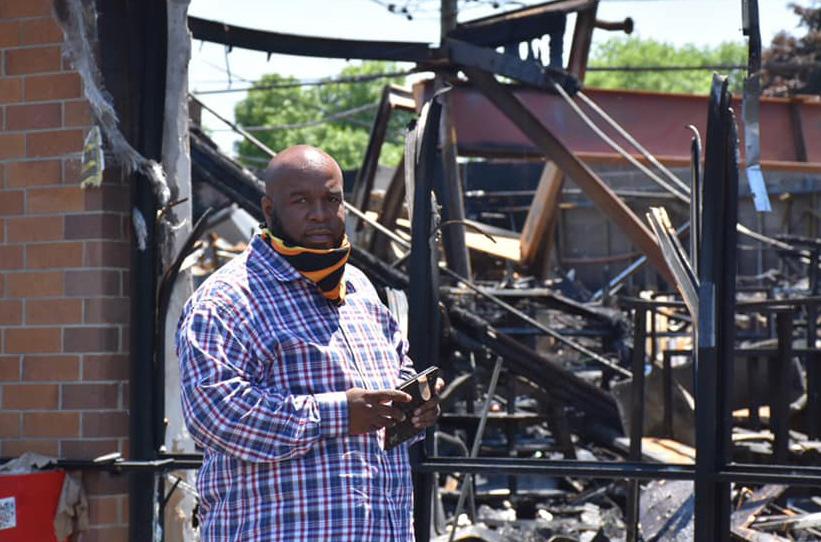
“Everything where I am in general is devastated,” said Gray, who pastors Connection Community Church in Calumet Heights. Gray said the action was “self-destructive, passion-filled opportunism fueled by powerlessness and hopelessness.”
There’s a whole generation on which the gospel has not had an impact, Gray said. They’re angry, and they don’t have the mechanics or maturity to channel that emotion well. And in large part, he said, the church isn’t seen as an ally.
“These young people are running around like sheep without a shepherd,” he said. “You should not be surprised they act lost, because they are lost....They need to see us out there,” Gray said. “They need to see us as relevant.”
In Chicago’s Woodlawn neighborhood, Pastor Corey Brooks and New Beginnings Church showed up to clean up their community. Brooks started the non-profit organization Project HOOD in 2012 to fight poverty and violence.
“I understand the frustration, I understand the disappointment, I understand the agonizing pain of seeing someone brutalized,” Brooks told FOX News. “I also understand that we have the right to protest according to the First Amendment. But at no time should we ever start looting and rioting and tearing up property, and dismantling possessions that people own.”
Brooks said Project HOOD is attempting to share love and peace in Chicago, and point people to better alternatives. “We have to take a stand and say this is not going to work in our neighborhood.”
While 90% of pastors say their church would be open to a sermon on racism, only 26% say anyone from their own congregation has urged them to preach on the subject, according to a 2017 LifeWay survey of Protestant pastors. If that survey were taken today, an important question would be “what form of racism?” In evangelical life, it’s easier to preach for personal repentance than for social reform.
“The biggest problem in the culture today is the failure of the church,” pastor and radio speaker Tony Evans wrote in the Dallas Morning News Individuals and families may have repented of racism, but the outworking of that has not passed through the church to the community (and thus to the culture at large). “The church must address racial, economic, health care, and opportunity inequity, as well as recognize the systems that work against fair treatment of people.
“The church must speak with one voice...and we should protest evil in a righteous way.”
“Let justice roll down like waters, and righteousness like an ever-flowing stream.”
– Amos, 8th century B.C.PURSUING JUSTICE – Following unrest in Chicago, Pastor Kenyatta Smith helped assess damage in the Auburn Gresham neighborhood. Photo below: Members and leaders from Crossroads Community Church participated in a peaceful protest in Glen Ellyn.
Illinois Baptist: What Scripture would you use to teach on injustice?
Marshal Ausberry: Last Sunday, I preached out of Esther 4:16. “…Then I will go to the king, though it is against the law, and if I perish, I perish.” Mordecai says, “Hey Esther, you’ve got a position, you’re in proximity to power. Will you stand up for your people?”
Will the church stand up for people? The church must stand up and declare loudly and profoundly from the pulpit, and prophetically from the pulpit, that racism is wrong. Racial injustice is wrong.
IB: That hasn’t always been the church’s position.
MA: The church in America at one time embraced slavery, condoned racism, and Jim and Jane Crow laws. It’s almost as if God has shut down the world and gotten everyone’s attention, especially his church. It’s like he has said, “OK church, you got it wrong in the beginning. Now you have an opportunity to get it right and stand up for people, for the least of these, for the disenfranchised, for those who are abused, assaulted, subject to racist policies.”
The church has got to bring the light to the world.
IB: What do you think is different about right now?
MA: I was a little boy in the 60s, when the Civil Rights peaceful marches were going on. There were photographs and some video strips of the Bull Connors of the world, of fire hoses on people, dogs on people, billy clubs on people. Women being beaten by police officers. Young men who were marching peacefully being abused, beaten, bloodied, and jailed. What propelled the Civil Rights movement were those pictures that went around the world.
Even now, with George Floyd in particular and Ahmaud Arbery, those powerful videos spoke volumes that people could no longer deny. And it was so appalling that good people could no longer be indifferent.
IB: Do you think the church is finding its voice on this issue of injustice?
MA: I do. Like never before. What happened with George Floyd, it was so graphic and repulsive, that when people saw it, they could not ignore it. And I think God just pierced their hearts with this brutality to another human. I’ve been thankful to see the Church has really been on the front lines to say racism has got to stop, this is
unfair. In 2020, it’s untenable that this kind of behavior still goes on.
IB: ‘Black Lives Matter’ as a slogan has stirred controversy because it’s sometimes thought to exclude nonblack lives. Can you help us understand the concept?
MA: From Genesis 9:6, we know that all lives matter. We’re image-bearers of God. No matter the hue of our skin, we’re all created in the image of God. If we can respect each other as children of God, imagebearers, that’s where we start. We’re not negating that all lives matter. But at the seminal moment in America, it’s our black brothers and sisters whose lives are at risk. When we say “black lives matter,” at this moment, we need to raise this issue up because it’s black lives that are paying the price.
IB: The SBC has made statements on racism on several occasions. Is something more needed now?
MA: We have come a long way. We ought not downplay that. We can celebrate our victories. But that doesn’t mean we stop there. We’re still at the beginning. The SBC has a tough history to press through.
IB: Leadership is a key issue.
MA: If you look at a lot of our entity structure, in their cabinet offices, in their senior leadership, you don’t see a lot of black and brown people, or Asian or Native American. We always want qualified people, that goes without saying. But we have to get used to seeing black and brown faces in high places.
IB: You’ve talked about how important trust is in the process.
MA: There’s a trap we can fall into if we’re not careful, that we always hire people like ourselves. It’s an inherent bias we have. Not intentional, but inherent. When I was growing up, my dad would allow me to use the car, but I couldn’t own the car. We have to have the mindset in the SBC that we are ready to own and drive the car at the same time. The litmus test is where we stand on the Bible, and The Baptist Faith and Message. That’s the litmus test.
IB: And not comfort.
MA: Right. Trust will override comfort.
As a convention of churches committed to the equality and dignity of all people, Southern Baptists grieve the death of George Floyd, who was killed May 25, 2020, in Minneapolis, Minn.
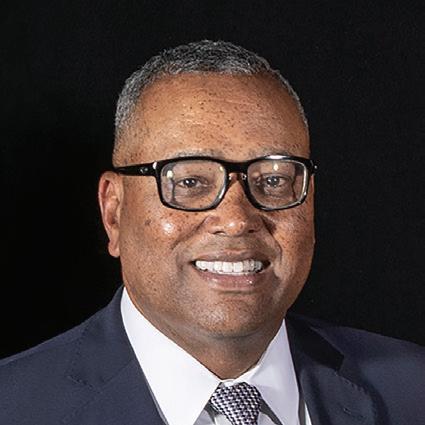
While all must grieve, we understand that in the hearts of our fellow citizens of color, incidents like these connect to a long history of unequal justice in our country, going back to the grievous Jim Crow and slavery eras. The images and information we have available to us in this case are horrific and remind us that there is much more work to be done to ensure that there is not even a hint of racial inequity in the distribution of justice in our country. We grieve to see examples of the misuse of force, and call for these issues to be addressed with speed and justice.
While we thank God for our law enforcement officers that bravely risk their lives for the sake of others and uphold justice with dignity and integrity, we also lament when some law enforcement officers misuse their authority and bring unnecessary harm on the people they are called to protect. We further grieve with our minority brothers and sisters in the wake of George Floyd’s death, pray for his family and friends, and greatly desire to see the misuse of force and any inequitable distributions of justice come to an end.
Throughout the Old and New Testaments, the Bible speaks to matters of justice and human dignity. We are taught by Scripture that human beings are distinct among the rest of creation as those beings which bear the divine image. From the beginning of life to the end, all human beings, both male and female—of all ethnicities, colors and ages—are sacred beings that God values and loves.
Throughout the law, the prophets, the gospels, and the entire canon of Scripture, murder is condemned and God’s people are called to protect the vulnerable. The Bible further condemns injustice and the misuse of authority and force. And in the example of Jesus Christ, God’s people are called to love others, care for their needs, grieve with them in brokenness, and labor for the wellbeing of our neighbor. To follow Christ is to follow in these examples he puts before us.
Therefore, as a matter of Christian obedience and devotion, followers of Jesus Christ cannot remain silent when our brothers and sisters, friends and/or people we seek to win for Christ are mistreated, abused, or killed unnecessarily.
Therefore, we pray for our local, state, and national leaders as they seek justice, and call on them to act quickly and diligently to ensure that these situations are brought to an end. As a people, Southern Baptists stand ready to help towards that end. May God give us his favor, help, and strength in this effort.
Written by Jamie Dew, President, New Orleans Baptist Theological Seminary, and J. D. Greear, SBC President.A mural painted on an overpass in Effingham, Ill., once bore a reminder of the town’s most famous site. “The Cross at the Crossroads” stands 198 feet tall at the intersection of Interstates 70 and 57. A much smaller rendering of the cross appeared on the mural near Effingham High School, until it was painted over in May.
The Wisconsin-based Freedom From Religion Foundation had objected to the cross’s inclusion in the mural, which is on city property. They sent a letter to the mayor, and Effingham’s city council eventually decided to have the cross removed from the mural.

“The city doesn’t have artistic objection to the design or content of the mural,” Effingham said in a statement following the decision. Still, the cross was painted over, the City said, to avoid members of the community feeling “excluded or treated as second-class citizens because they hold a minority belief.”
The Effingham cross is one example of the complexities of our First Amendment freedoms, and the current debate surrounding religious liberty.
Six months ago, the Becket Fund for Religious Liberty released its first ever Religious Freedom Index. The survey of 1,000 Americans was designed to measure perspectives on the First Amendment, which includes, among other rights, that “Congress shall make no law respecting an establishment of religion, or prohibiting the free exercise thereof.”

Becket’s findings were hopeful—very much so, in fact. The survey found large majorities of Americans support the freedom to practice religion in daily life without discrimination, and favor religious groups making employment and leadership decisions without government interference.
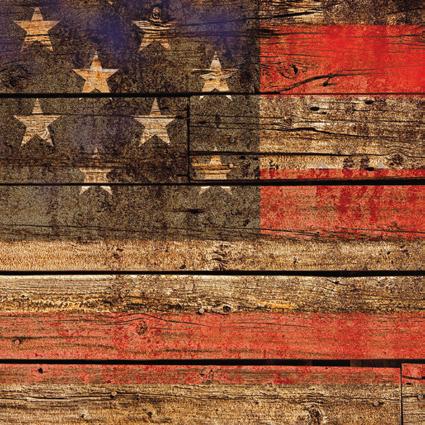
Still, even with the encouraging numbers, religious freedom “sits at a historical inflection point,” Becket reported. “Coming years could show religious freedom weakening and dividing along partisan lines or strengthening and expanding across demographics.”
That was before a global pandemic sent shockwaves through every part of life, on a global level.
Along with nearly every other established institution, the Church was forced to halt normal operations and settle in for months of something else.
As the stoppage drug on, church leaders wrestled with competing priorities— religious liberty, submission to authority, and love of neighbor among them. Religious freedom became a key player in the conversation around when churches could and would reopen, especially in places where restaurants and businesses were able to open, or where COVID-19 cases were relatively rare
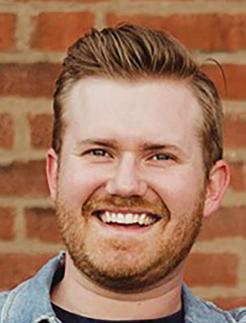
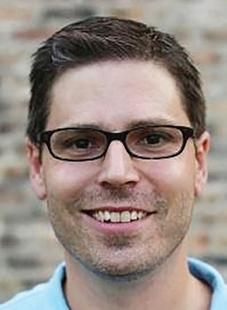

“We as a church know how to keep our people safe, to exercise health safeguards, and to create a safe environment for worship, and we’re not allowed to do so,” said Illinois pastor Rob Schneider. “That is a religious liberties issue.”
Now, even as many churches are opening their doors to in-person gatherings again, the religious liberty questions raised by COVID-19 persist. Especially in light of a possible second wave of the pandemic, or another similar, previously unthinkable circumstance.
The effect of this season on the church will likely take years to recognize. How churches defined and interacted with their religious freedoms during the pandemic is one key area to watch.
In May, the Illinois Baptist State Association held two virtual town hall meetings on reopening that engaged discussion on the religious liberty angle. Illinois pastors had widely varying views on the legality of states imposing limits on church gatherings, but IBSA encouraged a thoughtful process that included input from Alliance Defending Freedom, a non-profit legal organization and ministry partner.
“We’re looking for places where the churches receive disparate or unequal treatment,” said Joseph Infranco, senior counsel for ADF. In other words, places where other kinds of group meetings—birthday parties or book clubs, for example—are allowed, but a Bible study of the same size wouldn’t be.
On May 28, Gov. J.B. Pritzker’s administration released guidelines for churches planning to reopen after Coronavirus. The guidance urged caution, but loosened previous restrictions that had limited gatherings to 10 or fewer people.

Continued
Schneider’s Calvary Baptist Church in Edwardsville had already planned to start in-person services, after weighing insurance questions and whether individual church members could face penalties for meeting despite the current stay-at-home order. “For us to be unable to have worship is ludicrous,” Schneider said, especially considering large retail businesses were open, and in some cases, not taking the kinds of precautions Calvary planned to take.
The pastor’s rationale has been echoed across the country, as fair treatment has emerged as one way to identify a religious liberty concern in the COVID era. In a Mississippi town, for example, churches won the right to hold drive-in worship services when leaders noted nearby fast-food restaurants were allowed to operate in much the same way.
Travis Wussow of the Ethics and Religious Liberty Commission cited Nevada as one state where churches haven’t appeared to receive the same treatment as businesses, including casinos.
“I think, broadly, we should recognize that the government does have the legitimate interest and authority of keeping people safe,” Wussow said, “and that includes how we gather. So long as houses of worship aren’t being singled out and treated unfairly.”
Nathan Carter is familiar with policy inequities and how they can affect churches. In 2018, Immanuel Baptist Church finally purchased the building they’d been renting for years, after challenging a zoning ordinance that would have required them to provide parking not required of similar organizations in the neighborhood. Carter’s church prevailed with the help of Mauck & Baker, a religious freedom focused law firm in Chicago.
“That was a clear religious liberty issue, and it took a lot of work and prayer and time and money, but we prevailed,” Carter said. This time, though, Chicago’s Coronavirus restrictions are hitting most establishments similarly, the pastor said. If officials were allowing theaters to open and not churches, Immanuel would have called Mauck & Baker again.
“As long as they’re restricting people equitably and not targeting churches unfairly,” Carter said, “then I think for the sake of public health concerns and our witness in Chicago, we have to follow our local guidelines.”
A path forward
Carter said there are good protections in the law, and the U.S. Constitution is on the church’s side. Still, he said, there are threats lurking. Some church leaders are concerned the government’s ability to shut down services could open the door to infringements on religious liberty. Schneider said members of his congregation are worried officials have learned a new way to regulate activities over concern for public health, and could move to restrict more individual freedoms in the future.
Plus, Carter said, while the law may be on the church’s side, public sentiment toward the church increasingly isn’t. “As public opinion shifts,” he said, “it isn’t ridiculous to be concerned about [religious liberty] in the long term.”
One solution may be in shifting the perspective around dialogue with government officials. Wussow
P. 12
Gorsuch surprises conservatives in LGBT decision
Washington, D.C. | Christians and conservatives are grappling with what the Supreme Court ruling in Bostock v. Clayton County will mean for churches and religious institutions.
The 6-3 decision, handed down June 15, applies to the LGBT community the same anti-discrimination protections granted to women by Title VII of the 1964 Civil Rights Act. Conservative Justice Neil Gorsuch sided with the more progressive members of the Court and swing voter Chief Justice John Roberts. Gorsuch also authored the majority opinion.
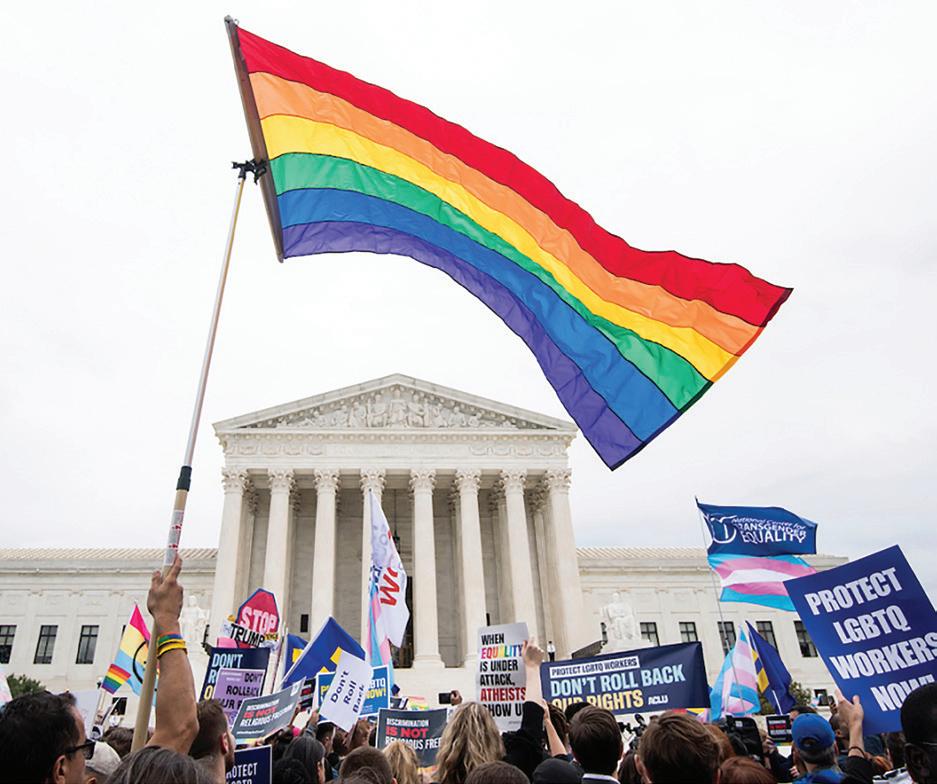
“The ruling…will have seismic implications for religious liberty, setting off potentially years of lawsuits and court struggles,” said Southern Baptist ethicist Russell Moore, “about what this means, for example, for religious organizations with religious convictions about the meaning of sex and sexuality.”
The case before the Court was actually a combination of three cases, two brought by homosexuals and one by a transgendered person. The Alliance Defending Freedom (ADF) represented Harris Funeral Homes in the case involving the transgendered person. A male funeral director, who had been an employee for nearly six years, began presenting as female. When he didn’t follow the funeral home’s dress guidelines for a male, the company fired him. The former employee then filed suit, charging violation of civil rights. (ADF is an IBSA ministry partner.)
Kate Anderson, senior counsel for ADF, sat third chair for the case. “We always look to laws to be interpreted the way they were written when they were passed,” she told the Illinois Baptist. “In 1964, everyone understood the definition of men and women. The concept of gender identity was almost unknown.”
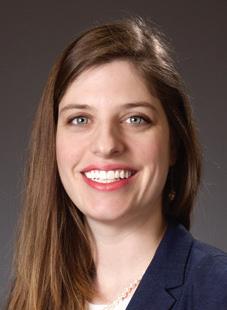
Anderson said what disturbed her most about the ruling was “to have so much of the Court embrace the idea that sex is not connected to biology.”
In the majority opinion, Gorsuch wrote while there may be many related issues waiting to be discussed, they’re for another time. However, many believe the ruling has done the opposite and are speculating on how the decision advises other parts of the law.
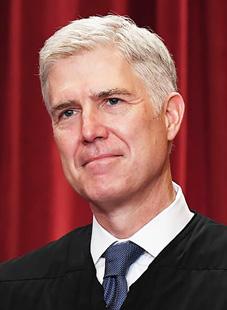
Anderson said, “Many laws look to Title VII to try to interpret Title IX. In Connecti-
cut, we’ve seen the stripping away of equal opportunity for girls to compete for sports scholarships. Already, they’ve been told [by school sports officials] that they have the equal opportunity to compete, but don’t have the equal opportunity to win.”
The ruling will have far-reaching consequences not only for churches and institutions, but women in general, she said. “You’re taking a law that has been about making sure women are treated equally in employment, and now saying there is no legal difference between men and women based on biology.”
In Illinois, an amendment to add LGBT rights to the state’s Human Rights Act was enacted in 2006.
Following the recent ruling, ADF hosted a webinar on how the decision will impact churches and ministries. Gregory Baylor, an ADF senior counsel, said the opinion questions the very meaning of religious liberty and ministerial exception. “Ministerial exception is simultaneously very powerful, but very narrow in which employee it applies to,” said Baylor.
To protect themselves, he suggested churches and religious organizations “write down what your religious convictions are and link them as closely as possible to your behavioral and hiring standards. You’re going to want to be able to prove that you are hiring people of a particular religious conviction.” To further strengthen your position, require employees to participate in religious training and activities, he advised.

All is not lost, according to Baylor.
“Congress can fix this interpretation of a statute,” he said. He urged Christians to reach out to their congressional representatives and ask them to pass legislation recognizing sex biologically in terms of the law.

The Illinois Baptist State Association has joined a legal challenge to state law that requires health insurance policies to cover elective chemical and surgical abortions, with no exemptions for churches.
“The Illinois Baptist State Association provides health coverage and pregnancy-related benefits through a third-party insurer to our employees,” said IBSA Executive Director Nate Adams. “This Association cannot morally participate in the funding of abortion— which we declare to be in conflict with our deeply held beliefs. The State of Illinois is forcing us to do that and that is illegal.”
The lawsuit, filed June 10 in the Sangamon County Circuit Court by the Thomas More Society, also includes a dental practice and a freight company. It asks the court to declare the mandate unlawful, and for an injunction that would prohibit the state from enforcing the requirements against the employers and their health insurance providers.
“The United States Supreme Court has repeatedly condemned this sort of government coercion against people of faith, including in the 2014 Burwell v. Hobby Lobby Stores, Inc. decision,” said Peter Breen, senior counsel for the Thomas More Society. “Illinois law protects the sincerely held beliefs of our state’s nonprofits and businesses, but our state’s politicians and bureaucrats have sat silent in response to the conscientious objections of people of faith to paying for elective abortions.”
In 2019, the IBSA Board authorized the Association to engage in the litigation, seeking an exemption from the law based on religious beliefs. “It’s not practical for every Baptist church to gain an exemption from this law,” Adams said then, “but if IBSA gains an exemption from this law on behalf of its member churches, any member church of IBSA can claim an exemption from it.”

encouraged church leaders that public officials want to hear from them. In general, he said, the story of the last several months has been churches and local and state leaders working together to keep people safe.
In Virginia, for example, 200 pastors shared their concerns about the state’s reopening plan with the governor, eventually reaching an agreement that allowed them to reopen earlier. Church leaders in Illinois similarly reached out to Pritzker, asking him to consider communities of faith in determining how the state will reopen.
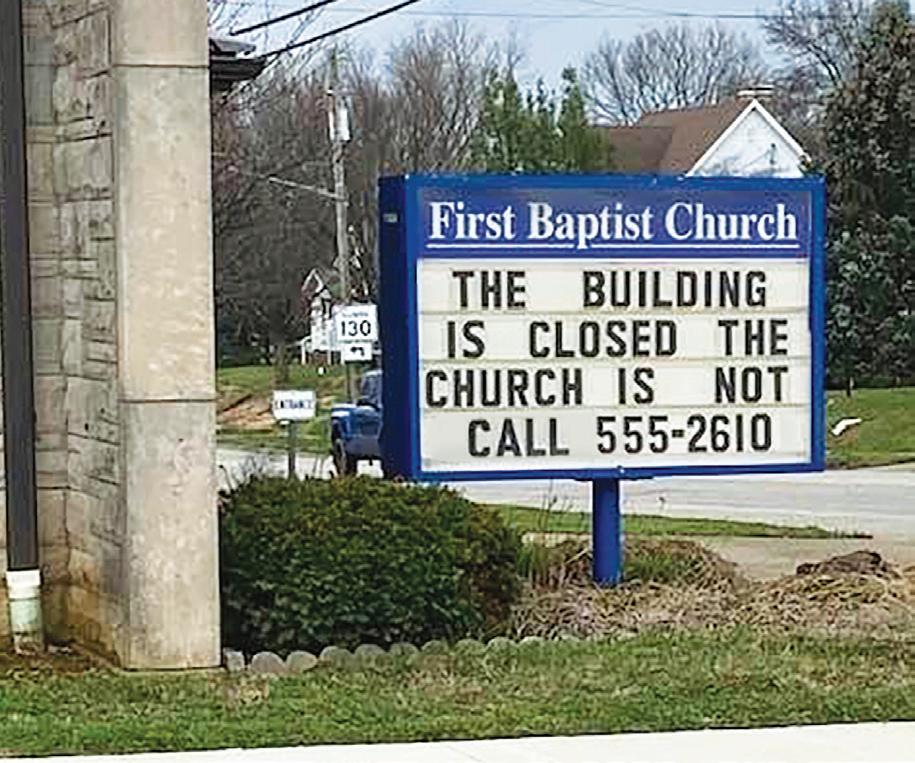
IBSA Executive Director Nate Adams joined church and denominational leaders who urged the governor to consult with religious leaders in determining next steps in the state’s reopening plan. “We believe we can work with you and your staff to create a plan that follows the science, protects the people we love, and give churches a greater hope through participation in the planning,” their letter read.
Pastor Sammy Simmons found new opportunities to engage local officials when he pitched a proposal that would allow churches in the county to reopen, with parameters in place. Simmons, pastor of Immanuel Baptist Church in Benton, presented his proposal to the county board, and contacted individual board members to discuss it. In the meantime, President Donald Trump declared churches essential and urged governors to allow them to reopen. More congregations began to move toward in-person gatherings, and Simmons’s proposal wasn’t ever voted on by the full board.
“But in the process, I got to talk to the chairman of our board,” said the pastor, who also serves as president of IBSA. “I got to pray with him several times. We got to have good conversations.”
In a post-pandemic world, engagement could be one key to a more robust understanding and embrace of religious liberty. The dialogues around COVID-19 noted by
religious liberty advocates like Wussow could set the stage for more helpful conversations in the future. Still, there are obstacles, and they may be especially difficult for younger leaders who understand the importance of religious liberty, but are disillusioned about engagement in the public square.

“I think a lot of younger pastors are left wondering whether their political leaders believe all the things they say they believe,” Wussow said. “One of my biggest concerns for the next generation of pastors is that they will overreact to some of that disillusionment and disengage from public life.”
Carrying the banner
Nick Volkening is a church planter in Champaign-Urbana. His New City Church hasn’t launched public gatherings yet. But during the pandemic, the young church has developed a ministry philosophy based on sharing the burdens of their neighbors.
“What we’re trying to embody here is to say, ‘Your problems are not just problems, they’re actually my problems,’” Volkening said. “Taking that posture is hopefully serving us well as we try to reach people who don’t know Jesus.”
Among his generation, Volkening sees an evolution in perspective on religious liberty because younger church leaders don’t expect to be loved and embraced by their government, he said. Where previous generations saw connections between the church and the larger culture, those connections are increasingly frayed now. The religious liberty he is compelled to protect, Volkening said, is the freedom to speak into issues like the current conversation on race and justice, primarily as a Christian deeply invested in the people and places God has called him to reach.
Religious liberty is becoming increasingly politicized, Wussow said. Everyone who cherishes religious freedom should be concerned about that, he said, and work to ensure that as broad a segment of American life as possible recognizes the importance and value of religious freedom.
“That’s part of the way through,” he said, “is to help enrich and fortify the way that we think about our public lives, and what it means for us to live out our faith in the public square.”

we’re family, IBSA churches receive benefits from our ministry partners.
products
CULTURE IS CHANGING Churches face legal issues all the time, so they need to be prepared. And when an issue arises, churches need trusted counsel.
My recent conversation with a student minister reminded me of a unique challenge brought on by all the virtual gatherings we’ve having during the Coronavirus pandemic. He had become aware of the need to plan guys-only and girls-only online meetings, so that leaders could ask students difficult accountability questions about their screen time.
In other words, he wanted to make sure students were fleeing the temptations so easily available online—now that much of their day is spent using a screen to do all the things they used to do at school and at church.
Even as in-person gatherings become more common this summer, that’s a question we all should answer, students and adults alike: Are we aware of online temptation, even if that temptation is simply to spend too much time online? How can you be constructive about your “virtual time”—now that it’s taking up an even larger part of your life?
There are others too, unique discipleship issues that have risen out of the sudden need to change almost everything about how we do church and ministry.
Across Illinois, small groups and Sunday school classes are still meeting virtually, even as weekly worship gatherings start again. Some community groups or Sunday school classes are comprised of several families or couples; other virtual meet-ups are only two or three people.
Whatever the online setting, now is a great time to ask some questions specific to this unprecedented
time. How are you spending your time, now that many commitments have been put on hold? Are you increasing your Bible reading? Spending more time in devotionaltype activities?
For students, are you joining your youth group? Most student ministers are working hard to provide even more activities than usual—small group Bible studies, online movie nights, virtual scavenger hunts.

The bottom line is this: In this new normal, how much of what you’re doing is impacting your faith and spiritual growth positively? Or negatively?
For parents, these weeks of uninterrupted family time can be an excellent opportunity to grow as the chief disciplers of your children. And for churches, this is an ideal time to train parents how to do that. At a church I previously served, we held a Sunday school teachers’ meeting every Wednesday night. I taught that week’s lesson to the teachers, who then taught it a few days later to students in their classrooms.
There are a variety of ways to institute a teachers’ meeting for parents right now. We have the technology and the time, and an opportunity we couldn’t have anticipated.
Let’s not neglect discipleship now, even though our methods and our questions will be different. As Christians, let’s commit to steward our time for his glory. As leaders, let’s help the people we lead use this time to grow closer to Jesus.
Jack Lucas is IBSA’s director of leadership development.

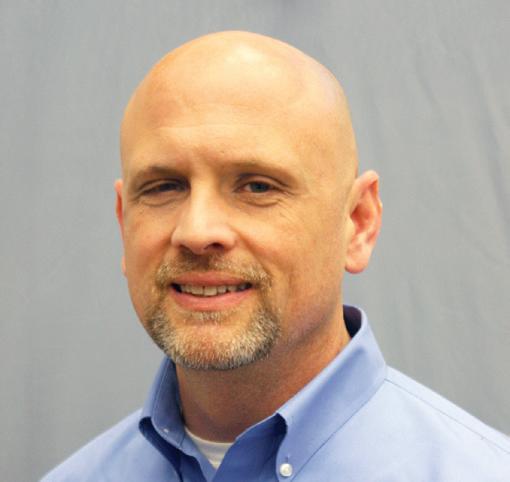


“There’s always more to do than you’ve already done, and less time in the day than there was an hour earlier. You can cross and cross and cross tasks off your list, but you’ll never cross out a crisis. Only God decides when a crisis ends and normalcy begins again.”
– David Gundersen, pastor, author, writer for The Gospel Coalition
Eric Mason
This book is about waking up to the sin of racism and how it has affected our culture. Mason writes, “This is the call of God on the church and every believer.”

Paul David Tripp
Elisabeth Elliot
These resources have helped strengthen my faith, reframe my perspective on my problems, and see that my personal and family suffering has a purpose. God is working it into a bigger picture that advances his kingdom.
Randall Goodgame
Honestly, my kids love this music, but I may listen to it more. Some of Randall’s albums are 100% Scripture and some are full of silly songs. There is also a Slugs and Bugs show on Right Now Media.
“We find out when trouble comes how the Lord’s light will shine on our pathways. We find out in the storms that he is our refuge and our hiding place in the tempest.”– Gardner C. Taylor, Baptist preacher, Presidential Medal of Freedom recipient
QIs it okay to combine finances with someone and start working on a budget before you marry them? I just got engaged, and we’ve been talking about the idea of getting a head start on our finances together.
AIt’s not a good idea to combine finances with anyone you’re not married to. Don’t get me wrong, I’m glad you two are thinking about your finances and your future—and I’d never wish anything bad for you—but all kinds of things can happen before you become husband and wife. What if you spend time paying off his debt, or vice versa, then the relationship doesn’t work out?
However, this doesn’t mean you can’t begin working together on budgets for the future, and planning and dreaming about the goals you have together. The thing to keep in mind is you’ll both need to be operating in full transparency mode to make it happen. He should know all about your income and debts, and you should know all about his. Along the way, you two need to have serious, regular discussions about saving, spending, and debt to ensure you’re completely on the same page with your finances before the big day.

QI’ve been researching long-term care policies. Can you reach a point financially where you can self-insure long-term care needs, and not buy a long-term care insurance policy?
AIt’s possible, mathematically speaking, if you have the resources available to pay for the care you’d receive in a nursing home or similar facility for about 20 years. Not many folks have that kind of money, though. I think it’s a large enough bill that it makes sense to transfer the risk to a long-term care insurance policy.
Keep in mind, too, if you’re married you have to think about your spouse, and make sure they have enough to live on comfortably at the same time. That’s a lot of money. And that’s why I advise virtually everyone to put good, long-term care coverage in place at age 59 or 60. It can mean the difference between living with dignity, or having to depend on the government!
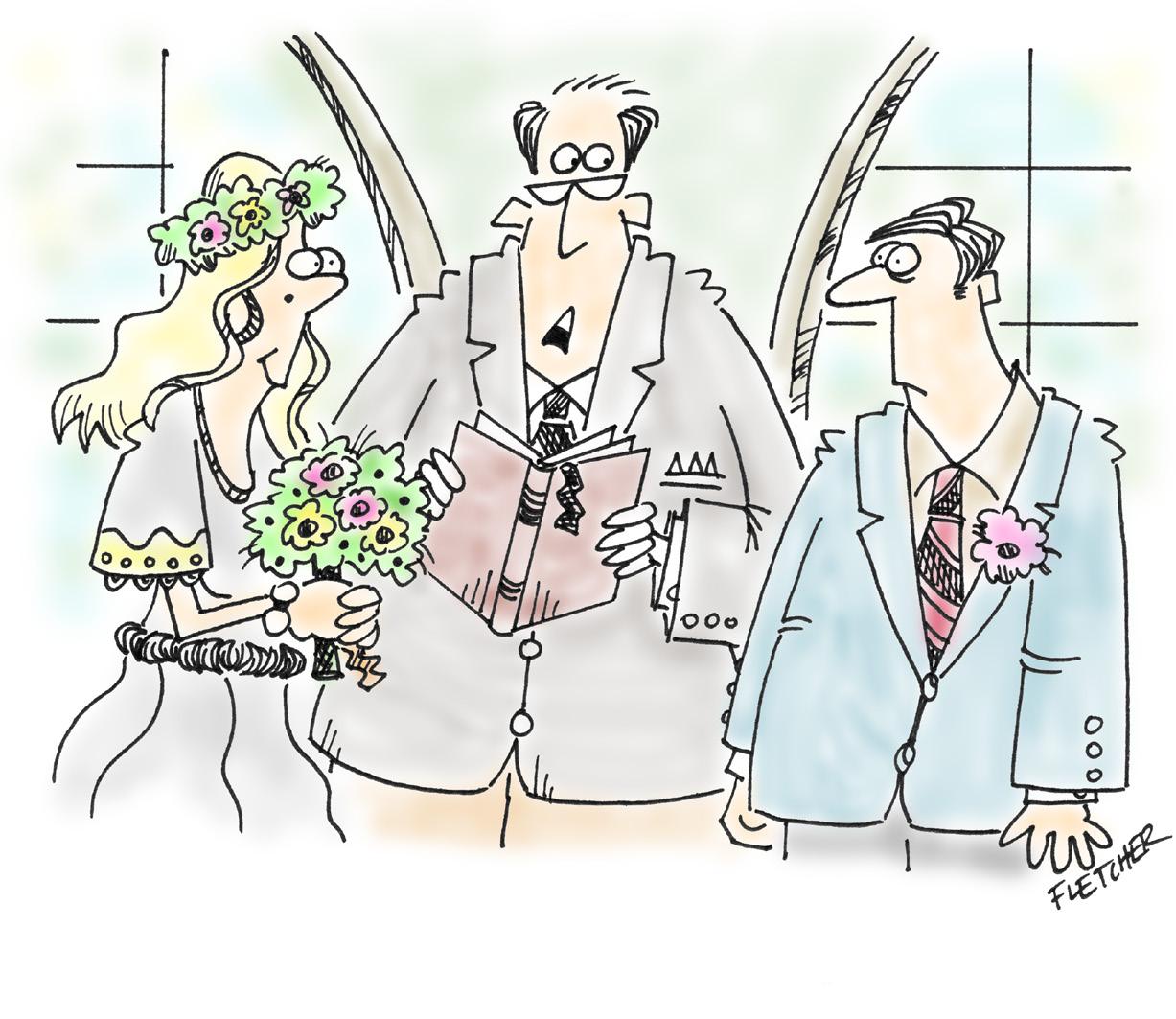
Financial advisor Dave Ramsey is a prolific author and radio host.
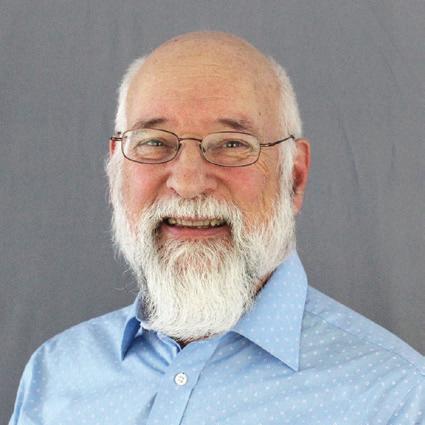

“Whether realizing it or not, every leader now has the added job of being a psychologist.”
Leadership expert Henry Cloud—himself a psychologist—said the COVID-19 pandemic has added a new hat to already heavy heads. At a recent webinar hosted by a Christian leadership network, Cloud said the current pandemic has cost people around the world three key components of humanity:
And because leaders are people too, they’re dealing with the same losses. Cloud’s counsel to them and their teams: take small, intentional steps forward. Make a list of things you can’t control, and worry about them for 10 minutes, he said. Surrender those things to God. Then, make another list of things you can control, and outline the steps needed to move forward on those issues.
In the early days of the pandemic, Illinois pastor Rayden Hollis noted his leadership team was
paying special attention to how they shepherded the congregation. They sought feedback on needs people had, and also encouraged churchgoers to lament and grieve an unprecedented season.
This moment is an opportunity for the gospel to become an ever-present truth for all of us, said Hollis, pastor of Red Hill Church in Edwardsville.
“We’re reminded of our imperfection. We have the opportunity to receive and extend grace to other people.”
“As a leader and a human, you are now called upon to lead in ways that are proactively and strategically intersecting these parts of how a human is constructed— making you something of a psychologist.”
– Henry CloudJOB OPENING
BFI is seeking an experienced, part-time accountant/bookkeeper.

Duties will include:
1. Day to day funds transaction support.
2. Preparation of managerial financial reports.
3. Assist with the preparation of standard financial statements.
4. Assist with periodic closing procedures and audit preparation.
Salary is negotiable based on experience, and it is anticipated that 80% of the position can be fulfilled by telecommuting.
For more information or to submit a letter of interest and resume, contact: Larry Douglas (Doug) Morrow, Jr., Baptist Foundation of Illinois, 3085 Stevenson Drive, Springfield IL 62703. Or e-mail Doug.Morrow@BaptistFoundationIL.org
meet the team
Zone Consultant, Zone 9
Family: Married to Sharon; four sons: Ben, Tim, Reese, and Sam; three grandchildren: Marina, Gianna, and TJ
Illinois experience: Minister of Youth and Education, Woodland, Peoria; Minister of Music and Missions, Meadow Heights, Collinsville; Minister of Education and Outreach, and Lead Pastor, FBC Waterloo; Transitional Pastor, Westview, Swansea
Favorite thing about church as a kid: Singing!
Favorite thing about church now: The fellowship of my church family
Favorite sports team: Arsenal Gunners (British soccer)
Favorite movie: Joe Versus the Volcano
Favorite book: The Bruised Reed by Richard Sibbes
“You may now elbow bump the bride.”
Favorite Old Testament prophet: Hosea
Favorite Scripture: Acts 4:10

What: Guidance for churches and leaders navigating the COVID-19 pandemic
When: Every Thursday at 11 a.m. Register: IBSA.org/church-helps
Find more information on ministry positions at IBSA.org/connect
Send NetworkiNg items to IllinoisBaptist@IBSA.org
First Baptist Church, Patoka, seeks a full-time pastor to lead this loving, mission-minded congregation of 5060 active members. Send resumes to Tom Chapman at 595 East 100th Ave., Patoka, IL 62975.
Central City Baptist Church in Centralia seeks a fulltime pastor, but would consider a bivocational pastor for our small congregation of around 60 people. Please send resumes to centralcitybaptistchurch@gmail.com.
Baptist Children’s Home and Family Services seeks dynamic individuals to serve in donor ministries. Positions are regionally based, full-time or part-time. Contact John McCarty at john.mccarty@bchfs.com.
Have you ever considered serving at the state level?
The IBSA Nominating Committee and Committee on Committees are seeking nominees for at least 30 positions on IBSA’s Boards and Committees.
Go to IBSA.org/nominations for an online nomination form, and a description of the Association’s six committees: Constitution, Credentials, Historical, Nominating, Order of Business, and Resolutions and Christian Life. In addition to IBSA’s committees, the Nominating Committee will recommend people to serve on the Association’s three Boards: IBSA, the Baptist Foundation of Illinois (BFI), and Baptist Children’s Home and Family Services (BCHFS).
E-mail BarbTroeger@IBSA.org for more information or to request a printed form. The deadline for submitting nominations is Aug. 14.
What: Helping pastors prepare to lead change and revitalization Upcoming sessions:
July 15: Create and cast a compelling vision
August 12: Creating a culture for change
September 16: Preparation, process, and practice Register: IBSA.org/leadershipdevelopment
QWith everything going on in the world, I’m finding I have deep disagreements with people close to me, even those who share my faith. I’m withdrawing from some people because I don’t want to get into certain issues. Any tips for finding common ground, and saving my friendships?
AI appreciate (and share in) your need for unity and peacemaking. Here are four suggestions that increase in difficulty. Just be prepared, loving people can be hard work!
MARK McCORMICKWhat: On-the-job training for new pastors, or a refresher for any leader in need of it Upcoming sessions:
August 6: What funeral directors wish pastors knew September 7: Funerals: The pastor’s perspective Register: IBSA.org/leadershipdevelopment
What: Equipping leaders in all areas of influence— relationships, marketplace, and the local church Upcoming sessions:
July 9: Communication styles: Are you being heard?
August 13: Situational leadership: Knowing which leadership style is best to lead others Register: IBSA.org/leadershipdevelopment
Carol L. Heironimus of Springfield died June 17 at the age of 73. A native of central Illinois, she worked as a church and school secretary and was a member of Eastview Baptist Church in Springfield. Her husband, Rick, is former executive director of the Baptist Foundation of Illinois, and her son, Drew, is IBSA’s director of information & technology. She is survived by her husband; two children; and four grandchildren.

Pastor Charles S. “Chas” West of Alton died May 24 after a brief illness. He pastored three IBSA churches over almost 40 years, serving at Rosemont Baptist Church (now Towerview Baptist in Shiloh), First Baptist of Casey, and First Baptist of Bethalto. He is survived by his wife, Kay; two daughters; and two grandchildren.

Prepare. Pray God will reveal your own sin, inconsistencies, and hypocrisy, and that he will humble your heart in preparation to model the grace he has shown to you. This is the time to keep your anger in check. Remember that apart from God we are helpless and hopeless to build meaningful relationships with anyone. Approach your neighbor with due dignity and respect. They are created by God and loved by him, as you are. This is already something you have in common.
Listen. Your job is to listen without interruption, so your neighbor feels heard. This will help ensure this will be the first of many conversations. This is not the time to prove your point or press an agenda to fix or change them. Try to understand their point of view, whether you agree with them or not.
Find common ground. Listen to what they share about their experiences and struggles. When we get to know people on a personal level, we validate their personhood and shared humanity. Your neighbor wants the best for their children, their families, and their futures, just as you do. You have more in common with them than you think.
Don’t expect reciprocity. This is the most important and difficult point I will try to make here, and the most impossible to accomplish apart from God. Our sinful nature makes us lazy, expecting others to return (in full measure) the grace and effort we have extended to them. Our fallen, transactional need to only love those who love us, is the root cause of division in our families, communities, and nation.
When we exercise unconditional, Christ-like love to others, we gain a renewed understanding of how much God loves us through our own sin, inconsistencies, and hypocrisy.
Mark McCormick is director of clinic operations for Illinois Baptist Children’s Home and Family Services. Send questions for Mark to IllinoisBaptist@IBSA.org.

Go to IBSA.org/church-helps to view a webinar focused on summer outreach and ministry ideas.
Invite families to gather at the church for a group bicycle ride around town. Spread the word to friends and neighbors. Work with local officials to map out a route and block off roads if needed.
IBSA has a movie screen and projector available for churches to use at a community movie night. Or take the party online. Churches in Chicago are gathering this month for a virtual, gospel-focused concert for students.
Attenders bring their own meal and chair. Consider pairing this community meal with an outdoor worship service.

Get ready now for unique ministry opportunities this fall. Ask schools near you what they need for back-toschool season. Enlist a volunteer team to stay connected and communicate the needs to your church.
Use the summer to teach kids or adults (or both) about missions. Go to WMU. com for free curriculum for preschoolers, kids, and teens, and check out IBSA.org/ CP for Cooperative Program videos and resources. Look for a full schedule of missions and leadership courses from IBSA, coming in September.
Schaumburg | Lydia Lee’s church isn’t new to Vacation Bible School. Korean Baptist Church in Schaumburg has hosted VBS for more than 10 years, said the children’s director. But, like almost every other ministry plan churches made for 2020, this summer’s VBS requires a different strategy.
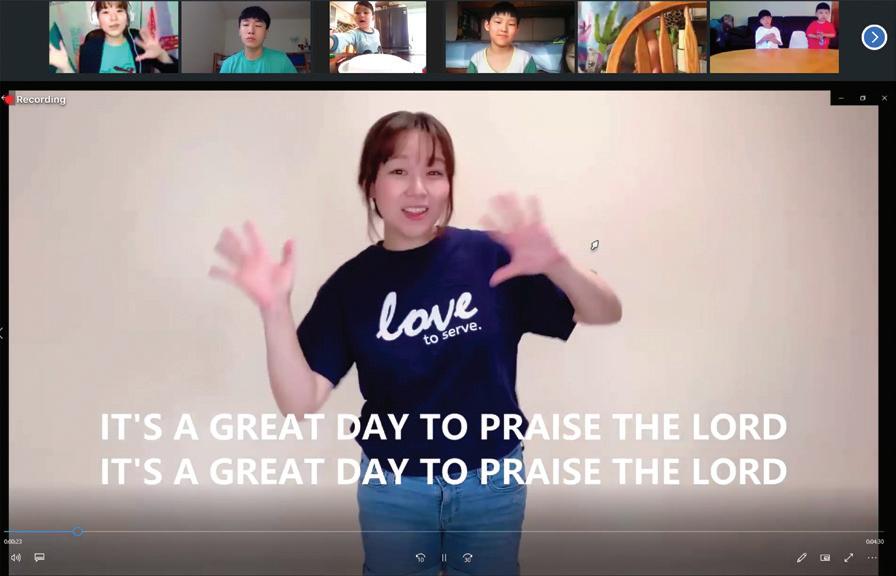

Lee and her team of volunteers moved “Concretes and Cranes” online. The activities are all there— worship, Bible study, crafts, recreation, and more. The schedule is different to accommodate the virtual delivery system.
“To help them focus more while we’re doing it, we decided to divide it into five weeks,” Lee said. Sessions are held from 10 a.m. to noon on Wednesday and Friday mornings, and each week corresponds to one day of VBS. After a worship gathering to kick off the day, Lee “sends” each age group to their classes. Teachers guide their students through the activities, and parents are encouraged to help younger children at home.
“This is such a blessing time that we can be involved with their faith life,” Lee said, “and teach them about God.”
The VBS began in early June with around 25 students the first week. The lead-up required many meetings—online, of course. Volunteers studied the Bible together too. To get ready for VBS, they read the book of Proverbs together and did daily devotions for 30 days.
“The staff members are not only ready with the materials,” Lee said, “but spiritually ready for this.”
IBSA offers students an alternative summertime favorite

IBSA’s summer camps for kids and students have been canceled due to limits on gatherings, but the Association is partnering with R.A.G.E. Ministries (Reaching a Generation Endangered) to deliver online camp for teens.
Large-group and breakout sessions are pre-recorded and available for viewing anytime, anywhere for any participating church. IBSA’s Jack Lucas said the resources are designed to look like summer camp, but can be used in any setting where students are regathering after several months apart.
“They’re packaging it as camp, but we see so many other ways it can be used,” said Lucas, director of leadership development. He suggested churches use the material for a Disciple Now weekend or fall retreat, or to connect with students on winter break. Speakers include some familiar to IBSA churches, including Clayton King and Chad Poe.
For discounted pricing, contact the Leadership Development team at (217) 391-3135.